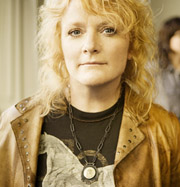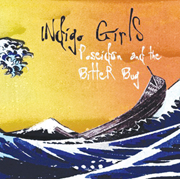An Indigo Girl

Indigo Girls fans who have been waiting longer than usual to hear from the out duo of Amy Ray and Emily Saliers will find their patience rewarded with not one, but two, CDs on the band’s latest Poseidon and the Bitter Bug (IG Recordings/Vanguard). The first release on their very own imprint, Poseidon and the Bitter Bug consists of a band disc and an acoustic disc, with the song order different on each. As usual, Ray and Saliers each wrote songs for this album and they alternate performing each other’s compositions, including standouts “Digging for a Dream,” “Driver Education,” “I’ll Change,” “Second Time Around,” and “What Are You Like?” I spoke with Saliers shortly before the release of the album.
Emily Saliers: [Laughs].
Well, I certainly don’t feel like any kind of mogul, I’ll tell you that. I just think that we’ve come full circle. We had a long history with Epic Records that, especially in the beginning and up through at least midway, was very productive and cooperative. And then it just ran its course. Then I was in the state of mind where I thought we’d go smaller with a label, but maybe there was still a label out there that has enough resources and creative ideas that can take us to the next level. Because when you’ve been playing and putting out records and been around for as long as we have, you’re always looking for a way to keep it fresh in people’s ears or get a new audience of some sort. Amy would have gone independent after Epic—that day, she was ready. I was thinking, let’s give this one more shot. We went with Hollywood [Records] and they were so excited to have us, blah blah blah blah blah. And that panned out to be nothing, just empty promises, [and] it didn’t work. We were happy that they dropped us and we’re very happy to have everything under our control. We have a very good relationship with our distributing company Vanguard.
Vanguard Records is a label with a long history in the folk and political-activist music realm, signing artists such as The Weavers, Paul Robeson, Buffy Sainte-Marie, and Joan Baez.
There is a lot of cache to being associated with that group of people. And the head of the label and distribution is a music guy. They’re music people. We met some of the staff and you just know when people love music and they’re not just bullshitters. And it’s a distribution deal; they’re not our record company. ? But they are in cooperation with us to get the music out there as creatively and quickly as possible. They’re willing to work with us and it’s a really good relationship. But it feels good to have everything under our control and in-house.
 Do you think there is any significance that this new disc is being released 20 years after your Epic debut?
Do you think there is any significance that this new disc is being released 20 years after your Epic debut? I think that’s just the timing, really. Our careers have had a sort of mysterious bet to it.
The fact that it’s come full circle to independence at a time when independence is the best way to get your music out there—I just feel like Amy and I have been extremely fortunate the whole way. I don’t know why, but I’m just grateful for it. I think the 20 years is cool, but you couldn’t have traced it and made it happen if you’d planned it out.
There were three years between Despite Our Differences and Poseidon and the Bitter Bug. Were your songs written over the course of that time or during a more concentrated period leading up to the recording of the disc?
For me, it was more like that. For Amy, she had been writing her songs over the course of time. But I had a really bad writer’s block this time around.
We actually made this record last spring [2008], almost a year ago, which is very unusual for us to sit on a record this long. But we were putting everything together—our plan for being on our own and for signing with Vanguard for distribution—and we didn’t want to release it in the horribly competitive fall quarter. Not that we couldn’t compete with anybody else of a certain echelon in terms of sales or whatever, but we thought, let’s just wait until the time feels right to release it. It happens to be now, in March [2009]. But my songs were written during a several month period leading up to when we actually went into the studio last spring.
How many songs did you each have to choose from that were whittled down to the five each on the first disc?
[Laughs] For me, I wrote five songs and I got five songs on the record. I think Amy had one or two extra. Sometimes she decides between what is going to be an Indigo Girls song and what is going to be a solo Amy Ray song. She’s more prolific than I am, so she’s got a whole treasure-chest full of songs from which to choose.
On the last record, Despite Our Differences, I had seven songs, and I couldn’t part with one of them. Thirteen songs is a lot for us, but we felt that they all worked together. But this time around it’s 10 songs on the record. But that’s cool because people’s attention spans are shorter anyway.
Poseidon and the Bitter Bug is a double disc set, with band and acoustic discs. Was that always the intention?
It was an idea that the producer, Mitchell Froom, had, and it struck us as a very good idea from the beginning. First of all, we’re a bar band, an acoustic duo. We travel and tour acoustically a lot. A good number of your fans like it that way. Also, I think it’s interesting for people who want to hear the music both with a rhythm section or produced with other instruments and arrangements or just to hear it the way it is when Amy and I first learn the songs in rehearsal.
The album is titled Poseidon and The Bitter Bug. “Poseidon” is mentioned in the song “Fleet of Hope,” and the “bitter bug” is mentioned in “Second Time Around.” How did you come up with title?
Again, all credit goes to Mitchell Froom [laughs]. We were sitting around in my house one day actually doing arrangement ideas and preproduction and just jamming on the songs together. He said, “You should call the record Poseidon and the Bitter Bug,” and he looked like he was making a joke. And we all laughed and thought it was funny. But then as time went on, the title stuck with us. I like the fact that it’s a lyric of hers and a lyric of mine, and that it’s got a certain whimsy to it that you can’t exactly put your finger on. I think that best expressed what was going on on the record.
I mentioned “Fleet of Hope” which has an aquatic theme. But there’s also a sadness to it, which also comes through on “Love of Our Lives.”
My songs are a bit world-weary on this record, I think, more so than any other group of songs on any other record for me. It was my state of mind when I was writing. We were still in the throes of the Bush administration. I mean, how f–king depressing is that? It was hard to have hope politically. All my friends broke up. I came out of a long-term relationship, so there was a lot of sadness, interpersonally.
It’s kind of like, life is great, but the longer you live, the more painful things you have to experience—whether through breakups or sickness, or the more you see what’s going on in the world with your own eyes. It was a very challenging time for me to be hopeful, and I certainly think that’s reflected in the lyrics.
You mentioned Amy’s solo records, of which she has three, and this is the first Indigo Girls record where a song from one of her albums — “Driver Education” from Prom — shows up. What was involved with that?
I think she just wanted a different incarnation and I just love that song. I think she wanted to treat it poppy and lively. We borrowed some of the elements from the other track. We double-tracked the vocals—there’s a guitar line that was recorded in the first version, and I sort of copied some of that. But it’s a completely different version if you compare the two. I like the idea of rerecording one of her solo songs and doing it together. I love that song. I think it’s very fun to sing on as well.
Another out performer, Missy Higgins, can be heard on a couple of tracks. How did that come about?
[Laughs] Mitchell Froom again! He produced her latest record. He was like, “Missy’s in town, wouldn’t it be great if she came out…” We hadn’t even heard her before, to be honest. He brought in her CD and played us some tracks, and we were like, “Oh my God!” She has an incredible voice and a great sensibility. “Digging for Your Dream” was the first one she sang on and then she sang on “True Romantic.” She’s very talented, great pitch, and a very cool person. And then we ended up touring with her in the States. She came over from Australia, where she’s massive, and, with all the humility in the world, opened some shows for us, and blew everybody away. So that’s a really good connection to have made.
A lot has happened in the past year. You mentioned coming out of the Bush era. Both musically and on an activist level, both you and Amy have made a point of being out there. Would it be fair to say that in addition to your role as a musician, your activist side got a workout during recent events, including the 2008 presidential election and gay marriage issues such as Prop. 8?
I wouldn’t say that it got a workout. We’re always interested in what’s going on out there, try to keep our finger on the pulse. Prop. 8 was a huge disappointment, a heartbreaker. I thought it was going to go the other way. Everybody who had hoped it would go the other way really believed it. We had such mixed emotions because of the combination of Obama’s victory and that happening in California. It was difficult to describe. I think you know what I mean and I think a lot of queer people do. It’s hard to feel two diametrically opposed emotions at the same time. That was challenging for a lot of people I know. As far as our activism, we certainly concentrate on queer issues, but also on environmental activism, especially through the indigenous lens, so we work with a group called Honor the Earth, and we’re in the communities where they’re fighting for solar power and wind projects and alternative energy projects, rather than coal fire and nuclear energy plants and nuclear waste dumping. That’s the thrust of our activism. We like to be aware of what’s going on out there and see if we can lend a helping hand.
Gregg Shapiro is a past recipient of the annual OutMusic award that recognizes contributions by non-musicians in furthering the work of GLBT performers.










